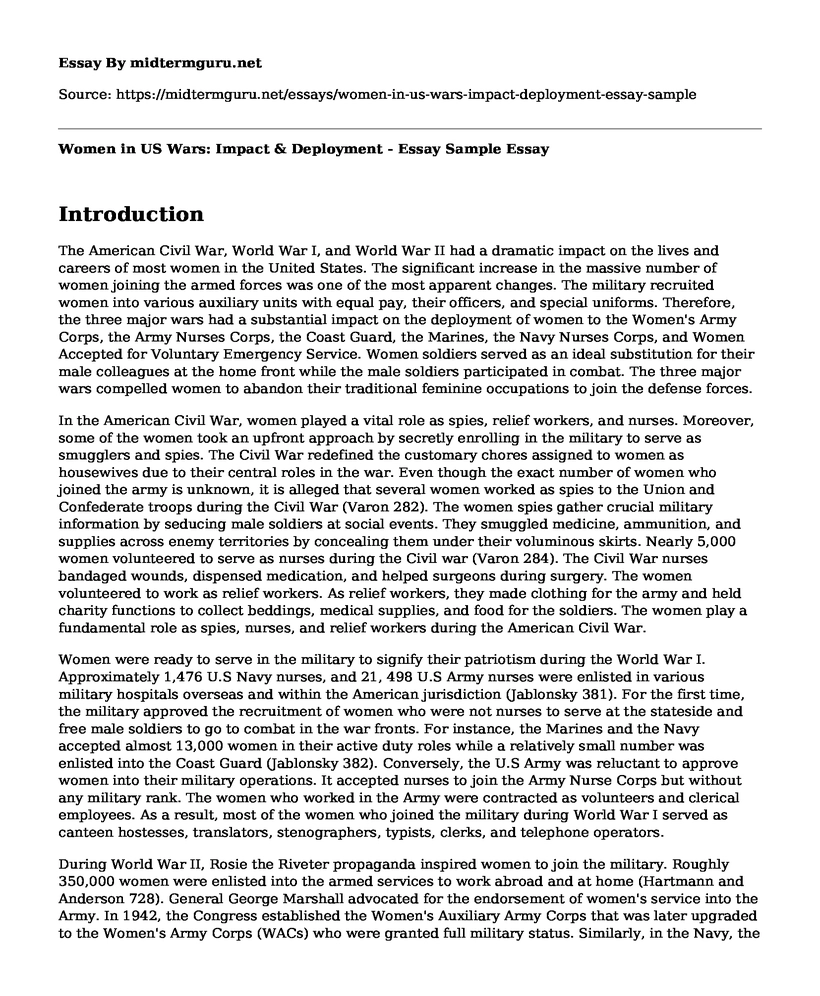Introduction
The American Civil War, World War I, and World War II had a dramatic impact on the lives and careers of most women in the United States. The significant increase in the massive number of women joining the armed forces was one of the most apparent changes. The military recruited women into various auxiliary units with equal pay, their officers, and special uniforms. Therefore, the three major wars had a substantial impact on the deployment of women to the Women's Army Corps, the Army Nurses Corps, the Coast Guard, the Marines, the Navy Nurses Corps, and Women Accepted for Voluntary Emergency Service. Women soldiers served as an ideal substitution for their male colleagues at the home front while the male soldiers participated in combat. The three major wars compelled women to abandon their traditional feminine occupations to join the defense forces.
In the American Civil War, women played a vital role as spies, relief workers, and nurses. Moreover, some of the women took an upfront approach by secretly enrolling in the military to serve as smugglers and spies. The Civil War redefined the customary chores assigned to women as housewives due to their central roles in the war. Even though the exact number of women who joined the army is unknown, it is alleged that several women worked as spies to the Union and Confederate troops during the Civil War (Varon 282). The women spies gather crucial military information by seducing male soldiers at social events. They smuggled medicine, ammunition, and supplies across enemy territories by concealing them under their voluminous skirts. Nearly 5,000 women volunteered to serve as nurses during the Civil war (Varon 284). The Civil War nurses bandaged wounds, dispensed medication, and helped surgeons during surgery. The women volunteered to work as relief workers. As relief workers, they made clothing for the army and held charity functions to collect beddings, medical supplies, and food for the soldiers. The women play a fundamental role as spies, nurses, and relief workers during the American Civil War.
Women were ready to serve in the military to signify their patriotism during the World War I. Approximately 1,476 U.S Navy nurses, and 21, 498 U.S Army nurses were enlisted in various military hospitals overseas and within the American jurisdiction (Jablonsky 381). For the first time, the military approved the recruitment of women who were not nurses to serve at the stateside and free male soldiers to go to combat in the war fronts. For instance, the Marines and the Navy accepted almost 13,000 women in their active duty roles while a relatively small number was enlisted into the Coast Guard (Jablonsky 382). Conversely, the U.S Army was reluctant to approve women into their military operations. It accepted nurses to join the Army Nurse Corps but without any military rank. The women who worked in the Army were contracted as volunteers and clerical employees. As a result, most of the women who joined the military during World War I served as canteen hostesses, translators, stenographers, typists, clerks, and telephone operators.
During World War II, Rosie the Riveter propaganda inspired women to join the military. Roughly 350,000 women were enlisted into the armed services to work abroad and at home (Hartmann and Anderson 728). General George Marshall advocated for the endorsement of women's service into the Army. In 1942, the Congress established the Women's Auxiliary Army Corps that was later upgraded to the Women's Army Corps (WACs) who were granted full military status. Similarly, in the Navy, the Women Accepted for Volunteer Emergency Service provided stateside support and were bestowed military status comparable to naval reservists. Female licensed pilots were given a chance to serve the army as Women's Airforce Service Pilots (Lundberg 373). The female pilots flew American military planes ferrying cargo from factories to bases. They participated in target missions and simulation strafing to free male pilots to engage in the World War II combat. The propaganda campaign played a vital role in inspiring women to join the armed forces as patriots.
The American Civil War, World War I, and World II obliged women to abandon their housewife roles to enlist into the armed forces. In the American Civil war, women played an essential role as relief workers, nurses, and spies. Likewise, in World War I, the military recruited civilians especially women to work as telephone operators, clerks, translators, and stenographers. During World War II, propaganda was used to convince women to join the armed services as American patriots.
Works Cited
Hartmann, Susan M., and Karen Anderson. "Wartime Women: Sex Roles, Family Relations, and the Status of Women during World War II". The Journal of American History, vol 68, no. 3, 1981, p. 728. Oxford University Press (OUP), doi: 10.2307/1902035.
Jablonsky, Thomas J. "Women, War and Work: The Impact of World War I on Women Workers in the United States". Women's Studies International Forum, vol 5, no. 3-4, 1982, pp. 381-382. Elsevier BV, doi: 10.1016/0277-5395(82)90052-8.
Lundberg, David. "The American Literature of War: The Civil War, World War I, and World War II". American Quarterly, vol 36, no. 3, 1984, p. 373. JSTOR, doi: 10.2307/2712739.
Varon, Elizabeth R. "They Fought Like Demons: Women Soldiers in the American Civil War (Review)". Civil War History, vol 49, no. 3, 2003, pp. 282-284. Project Muse, doi:10.1353/cwh.2003.0078.
Cite this page
Women in US Wars: Impact & Deployment - Essay Sample. (2023, Jan 12). Retrieved from https://midtermguru.com/essays/women-in-us-wars-impact-deployment-essay-sample
If you are the original author of this essay and no longer wish to have it published on the midtermguru.com website, please click below to request its removal:
- Essay on Critical Thinking, Problem Solving and Creativity
- History Paper Example: Discussion Questions on Emancipation of Slaves
- Reflection on a Personal or Professional Situation - Paper Example
- Post-Traumatic Stress Disorder of Veterans - Psychology Paper Example
- Paper Example on Causes of Russian Intervention in Ukraine
- Essay on Critical Incidents in the Classroom: Aggressive Behaviors and Outbursts
- Research Paper on American History







